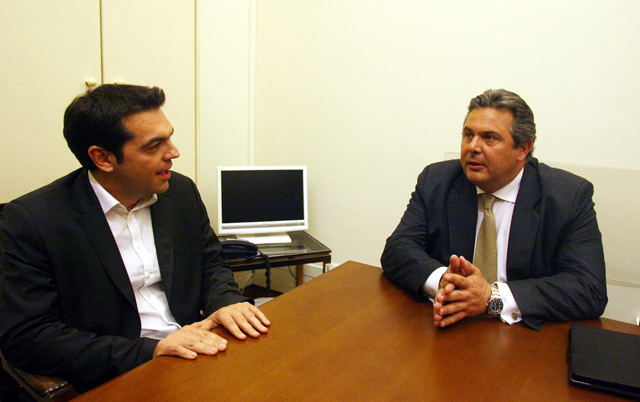By Holly Ellyatt, CNBC
A victorious Syriza looks to have formed a coalition government with an unlikely ally: the right-wing Independent Greeks party. But Greek politicians and market experts warned that left-wing Syriza faced immediate and pressing problems.
Global markets were jittery as investors digested news that anti-bailout Syriza won a general election in Greece on Sunday.
On Monday, the right-wing – and also anti-austerity — Independent Greeks party claimed it had struck a deal to form a governing alliance with Syriza, led by Alexis Tsipras.
Although talks between the parties took far less time than expected, the government’s policy strategy is still unknown, according to one former government minister.
“It’s ultimately going to be much more difficult to figure out exactly what policies they will ultimately agree on,” Petros Doukas, former deputy finance minister of Greece, told CNBC Monday morning.
He said that it would likely be difficult for Syriza and the Independent Greeks – coming from the left and right of the political spectrum – to agree on policy.
“It’s going to be an uphill battle between Syriza and their left-wing promises, which they will not be able to deliver absolutely because they have some major problems to tackle immediately (such as) the banking problem and social security problems – there’s seven billion euros (worth of debt) maturing in March and they need European liquidity support for that,” Doukas said.
Tsipras is opposed to austerity measures that were part of Greece’s financial bailout agreed with its international lenders in return for a 240 billion euro ($270 billion) bailout. The cuts and reforms have drastically put the brakes on the country’s economy and helped send unemployment levels to nearly 28 percent.
The Syriza leader has said he would try to renegotiate Greece’s debt agreements, focusing the attention of markets, euro zone leaders and not least of all, the troika of organizations overseeing Greece’s bailout – the European Commission, European Central Bank and international Monetary Fund.
European markets fluctuated on Monday following the result, with the Athens Stock Exchange trading down almost 5 percent.
Now, all eyes are on the party’s unlikely coalition and what this could mean for its radical policies — and whether it can turn those into reality.
“We know what the pre-election promises are but we need to see some action,” Konstantinos Botopoulos, chairman of the Hellenic Capital Market Commission, told CNBC., adding that many things were “vague.”
“The big problem is what the reality of government will be for a radical left party which has never been in government and has promised a complete change in politics that is very difficult to achieve.
Speaking to thousands of supporters in Athens on Sunday, Tsipras said Greece was leaving behind “catastrophic austerity” and five years of “humiliation and anguish.” However, he also struck a more conciliatory note towards Europe, saying he would cooperate with other euro zone leaders for “a fair and mutually beneficial solution.”
Speaking to CNBC in Athens, Doukas said Brussels should not try to punish Greece for the election result
“Brussels should not try to be vindictive or try to teach the new government a lesson. They should try to support Greece. Greece had its incomes and salaries and pensions cut by 35 percent. Here in Greece we have witnessed a liquidation process…and Europe should take note of that.”
“There are so much liquidity demands for the social security system, for the banking system, for the money (debt) maturing in March and has to be repaid so there is no such thing as ‘we will not communicate with the troika and we will not come to terms with them.'”
Facing the music
Meanwhile, the former tourism minister Pavlos Yeroulanos told CNBC that although Europe needed to help Greece, political debates within the country needed to change tack too.
“If you listen to the debate from all political sides it’s all about debt, it’s all about money, it’s all about cashflows,” he told CNBC in Athens Monday.
“But the reality is that we need to talk about goals, we need to talk about institutions and process and these things are not on the political table right now. Tsipras has failed to bring these things to the table but I think he will have to face this music very soon.”










